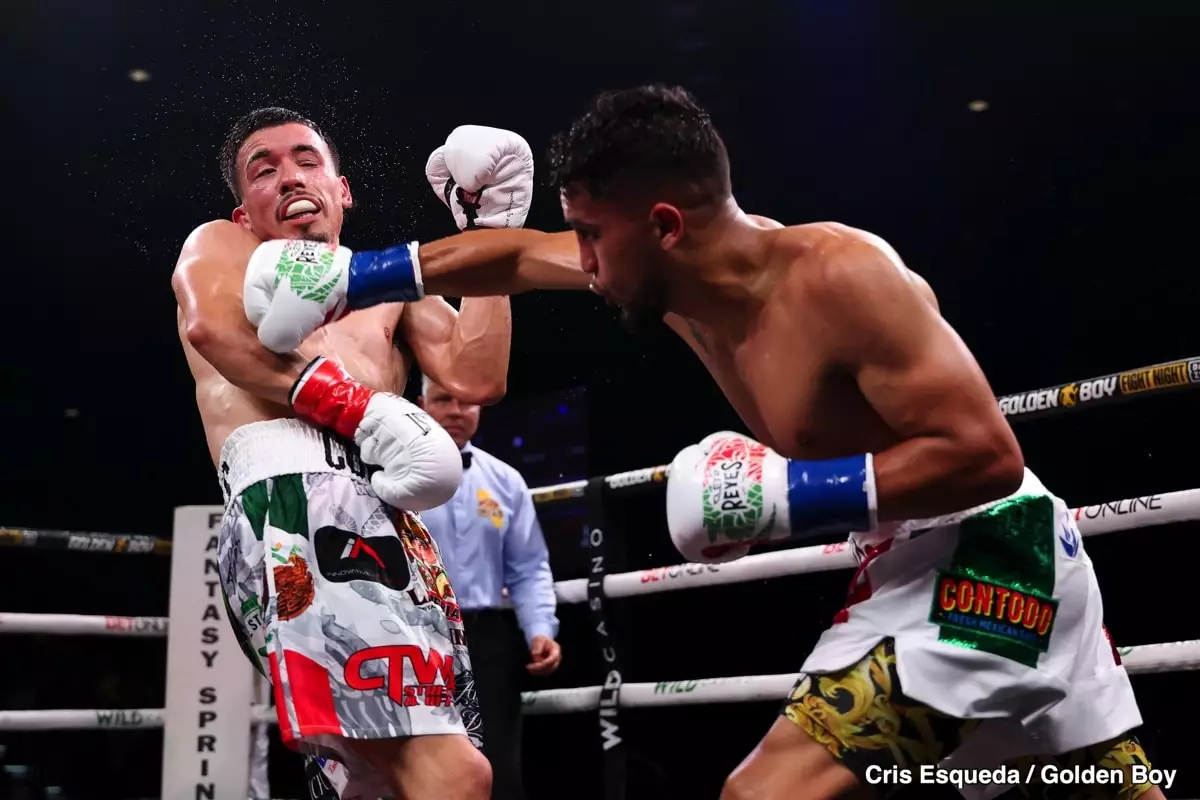In the world of boxing, where fighters dedicate their lives to a brutal pursuit of victory, fair judgment is the bedrock of credibility. Yet, the recent Golden Boy Fight Night at Fantasy Springs exposed a harsh reality: judges can sometimes appear uninterested or indecisive, casting doubt over the legitimacy of the sport. The main event between Manuel “Gucci Manny” Flores and Jorge Chavez exemplified this troubling phenomenon. The fight itself was spirited, with both fighters exchanging blows in a grueling ten-round battle. However, the judges’ decision—a majority draw—left a bitter taste for many viewers and the fighters alike. The scores of 93-97, 95-95, and 95-95 point to a clear divergence in perspective, but the complacency in delivering such a verdict suggests that judging panels might be more concerned with wrapping up the night than accurately rewarding the contenders.
Jorge Chavez’s frustration is well-founded. His skepticism about the judges’ objectivity underscores an ongoing issue in boxing: the subjective nature of scoring. When a fight ends with scores that seem detached from the overall action, it fosters mistrust among fans and fighters. Chavez’s assertion that the cut was caused by a headbutt and not punches, coupled with his criticism that Flores lacked power, reveals his belief that the scoring did not reflect the true dynamics of the bout. Such disputes point to a deeper problem: if judges are viewed as inattentive or biased, it diminishes the sport’s integrity. Without transparent, confident officiating, boxing risks alienating its passionate audience who expect justice inside the ring.
Moreover, the fight’s tactical nuances highlight a broader tactical issue—fighters playing it safe rather than risking decisive exchanges. Flores seemed cautious early on, perhaps wary of Chavez’s counterattacks or the judges’ scoring tendencies. Chavez, on the other hand, relied on movement, avoiding the hard-hitting moments that might sway the judges in his favor. This pattern of defensive boxing, while sometimes strategic, often leads to uninspiring decisions, leaving fans feeling shortchanged. If fighters think they need to dance around and avoid engagement to secure a draw, the sport’s competitive spirit is compromised. Active, aggressive boxing should be rewarded; otherwise, the risk becomes an exercise in patience and frustration rather than entertainment.
The undercard contests, meanwhile, showcased a more decisive display of skill and confidence. Jordan Panthen’s sorely anticipated bout was derailed by a tactical and composed Farid Ngoga, who demonstrated intelligence and calmness—virtues that stand out in a sport often dominated by raw power. Ngoga’s majority decision victory was fitting, based on his controlled boxering and strategic patience, contrasting sharply with Panthen’s failed attempt to impose his style. Such fights reinforce the idea that boxing is as much about intelligence as it is about brawn. Fighters who master control and adaptability will always have the upper hand, particularly when judging is questionable. It also underscores that fighters should focus on their skills and measurement, rather than wholesale aggression, to secure victory amid ambiguous outcomes.
Another noteworthy element of the night was the swift, decisive performances of fighters like Cayden Griffiths and Leonardo “Bazooka” Sanchez. Griffiths’ fourth-round KO of David Ramirez showcased the importance of confident, aggressive finishes, crucial for building a reputation and momentum. Sanchez’s knockout of Abraham Valdez in the same round amplified the narrative that raw power can still dominate in modern boxing, resonating with fans craving thrilling, conclusive victories. These highlight the importance of fighters stepping up and asserting dominance — actions that become memorable and meaningful, especially when judging controversies persist. Fighters must seize opportunities to leave no room for debate, especially when the legitimacy of judging is clouded.
While not every bout resulted in explosive finishes, the night’s best decision came from Javier Meza, who convincingly outboxed Cesar Villarraga across six rounds. Without controversy, the judges’ unanimous scorecards confirmed the clear superiority of Meza. This segment of the night reaffirmed an essential aspect of professional boxing: when fighters execute well and judges recognize their efforts transparently, it restores faith in the sport. It demonstrates that with proper focus, skill, and clarity, boxing can deliver definitive outcomes that respect both the fighters and the fans.
Ultimately, the night underscored a significant challenge: the necessity for reform in judging practices and a reinvigoration of the sport’s integrity. While fighters continue to push their limits, the overarching system must earn back the trust of viewers who crave fairness and clarity. As boxing evolves, it must prioritize transparency and consistency, ensuring that decisions aren’t left to what appears to be a roll of the dice. When fighters like Chavez and Flores clash, the root issue isn’t just the scorecards but the sport’s ability to unequivocally recognize true dominance and effort. Only then will boxing truly live up to its reputation as a sport of skill, resilience, and justice.

